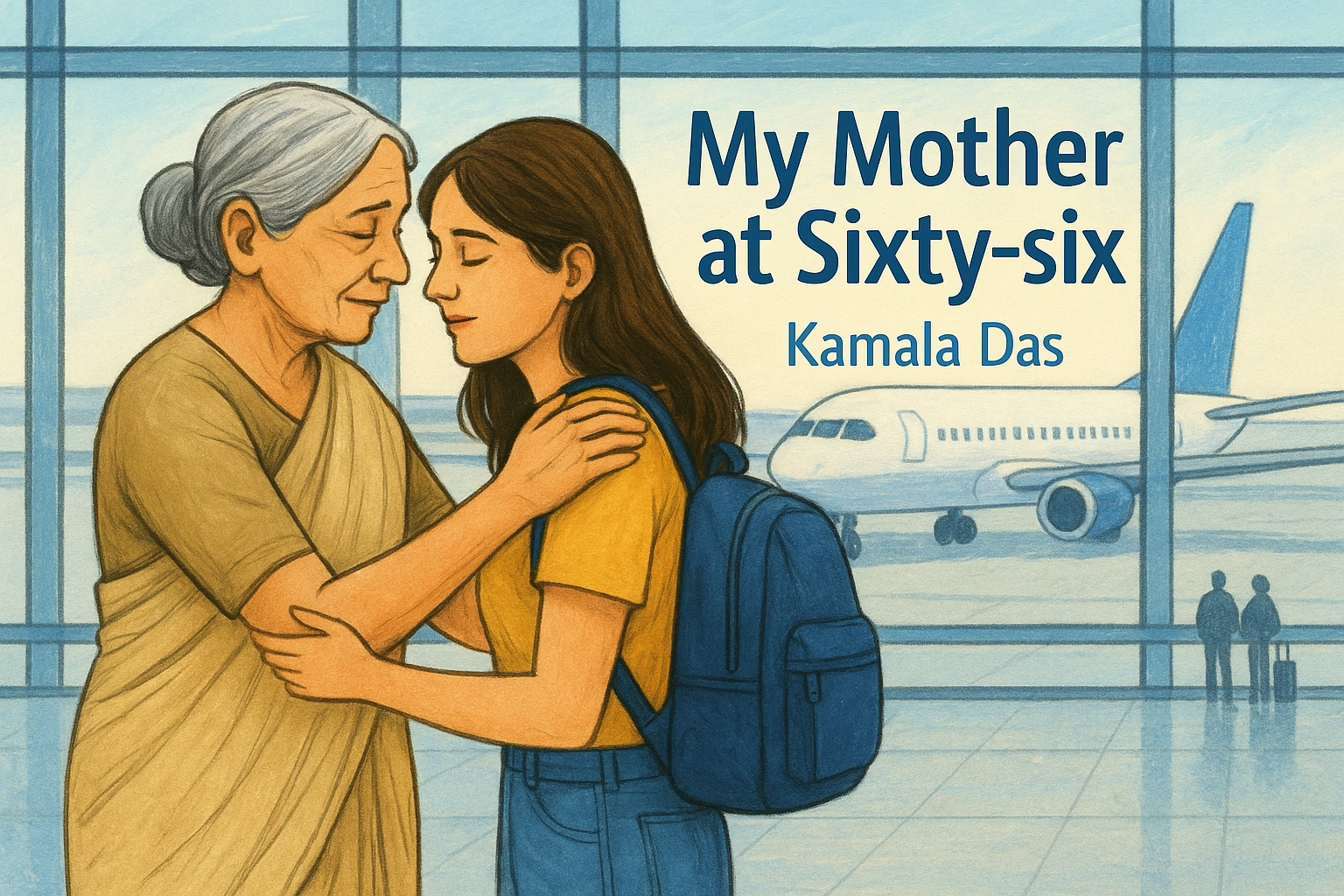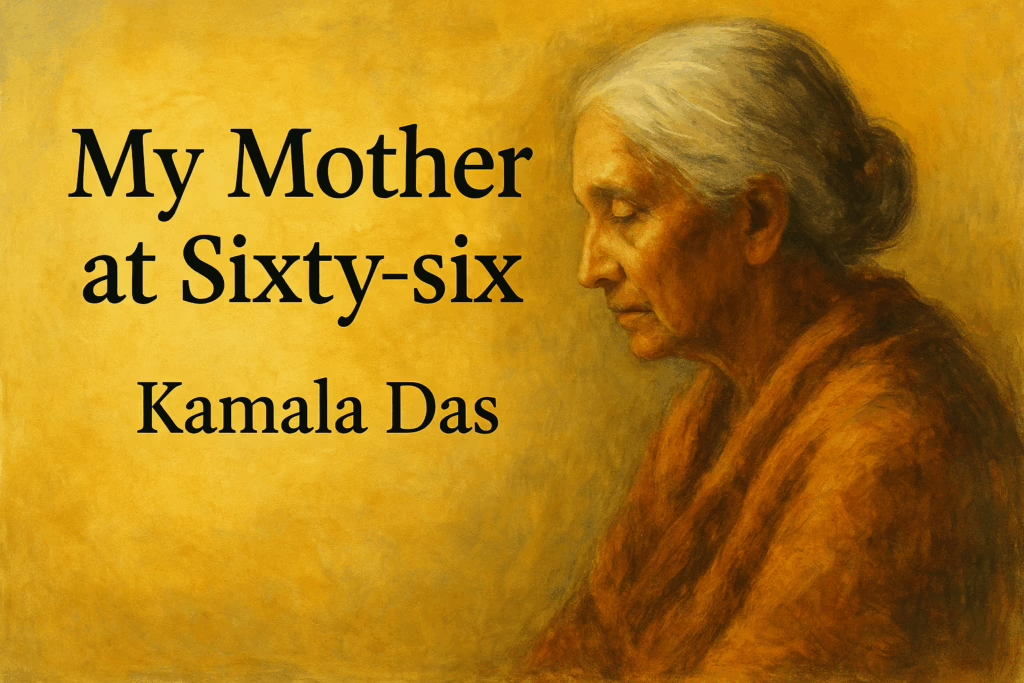Kamala Das’s My Mother at Sixty-six is a deeply intimate poem that captures a daughter’s sudden confrontation with her mother’s ageing and the silent fear of separation it awakens within her. Although the poem is short and written in a single flowing sentence, its emotional depth lies in the subtle details—images, comparisons, and fleeting observations—that reveal the poet’s inner turmoil. Each expression, from the mother’s “ashen” face to the “sprinting” trees outside the car window, has been crafted with precision to mirror the shifts in the poet’s thoughts and feelings.
An expression-wise analysis allows us to slow down this continuous stream of consciousness and explore how each phrase contributes to the poem’s themes of love, ageing, memory, and fear. By examining the poem piece by piece, we uncover the layers of meaning that make this seemingly simple farewell moment profoundly universal and emotionally resonant.

Analysis
1. “Driving from my parent’s home to Cochin last Friday morning,”
- Sets the scene and time.
- Shows the poet is travelling with her mother, suggesting familiarity and routine.
- The mention of “parent’s home” hints at roots, belonging, and childhood memories.
2. “I saw my mother, beside me,”
- Immediately draws attention to the mother–daughter relationship.
- The mother’s presence is physical but soon shown to be emotionally disturbing.
3. “doze, open mouthed, her face ashen like that of a corpse”
- The mother is sleeping, but her posture suggests frailty and exhaustion.
- “Open mouthed” indicates lack of control, a sign of old age.
- “Ashen” and the simile “like that of a corpse” show the poet’s fear:
→ Her mother looks close to death. - The shock of this image triggers the poet’s emotional pain.
4. “and realised with pain that she was as old as she looked”
- The poet confronts the truth of ageing.
- The “pain” is emotional—born from the fear of losing her mother.
- This realisation is difficult, showing her inner conflict.
5. “but soon put that thought away,”
- The poet attempts to escape painful emotions.
- Common human reaction when faced with mortality—denial.
6. “and looked out at Young Trees sprinting,”
- “Young Trees” symbolise youth, vitality, and movement.
- The word “sprinting” indicates speed and life.
- Also creates a visual illusion—trees appear to run because the car is moving.
- Represents the energy of life, in contrast to the ageing mother.
7. “the merry children spilling out of their homes,”
- “Merry” shows happiness and innocence.
- “Spilling out” suggests carefree spontaneity.
- Children represent fresh beginnings, again contrasting the mother’s condition.
- These images temporarily distract the poet from her painful thoughts.
8. “but after the airport’s security check,”
- The poet is physically separated from her mother.
- The security check creates a symbolic distance—a barrier.

9. “standing a few yards away, I looked again at her,”
- Distance emphasises the mother’s vulnerability.
- The poet’s gaze returns to her mother, showing her emotional pull and concern.
10. “wan, pale as a late winter’s moon”
- “Wan” means colourless, weak.
- “Late winter’s moon” is dim, pale, and fading—symbolising
→ old age
→ fragility
→ the nearing end of a cycle - Shows how the mother appears fragile and aged.
11. “and felt that old familiar ache, my childhood’s fear,”
- The ache is fear of losing her mother.
- “Old familiar” shows this is not new—she has feared separation since childhood.
- This connects past and present emotions, showing deep bonding.
12. “but all I said was, see you soon, Amma,”
- The poet suppresses her emotions.
- “See you soon” is both hopeful and comforting.
- Use of “Amma” shows intimacy and love.
- She speaks lightly to hide her deeper fear.
13. “all I did was smile and smile and smile……”
- The repetition shows her desperate attempt to stay positive.
- A forced smile: a mask covering grief.
- Symbolises
→ courage
→ love
→ emotional restraint - The trailing dots suggest unspoken emotions, fear, and uncertainty.
Overall Poetic Effect
- The poem is written in one long sentence, reflecting an uninterrupted flow of thoughts and emotions.
- Themes:
✔ ageing
✔ fear of loss
✔ love & attachment
✔ denial vs acceptance - The poem balances inner emotional turmoil with external lively imagery.
Through an expression-wise reading of My Mother at Sixty-six, we come to appreciate the quiet brilliance of Kamala Das’s poetic craft. Every image, comparison, and fleeting observation adds emotional weight to the simple yet powerful scene of a daughter parting from her ageing mother. The poem’s uninterrupted flow mirrors the poet’s own unbroken stream of thoughts—fear, tenderness, denial, and resolve—coexisting within a single moment. By examining each expression closely, we uncover how deeply the poem reflects universal human experiences: the inevitability of ageing, the pain of impending separation, and the instinctive desire to mask sorrow with a reassuring smile. Ultimately, the poem remains a poignant reminder of the fragile beauty of familial bonds and the emotions we often carry unspoken in the quiet corners of our hearts.



